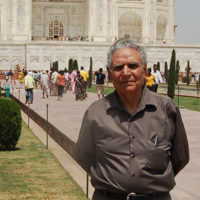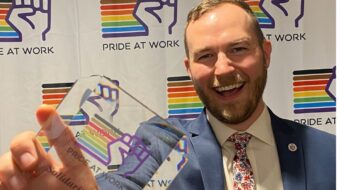Standing before the joint houses of India’s parliament, U.S. President Barack Obama began his speech by addressing the “representatives of more than one billion Indians and the world’s largest democracy.”
The president continued, “I bring the greetings and friendship of the world’s oldest democracy — the United States of America, including nearly three million proud and patriotic Indian Americans.”
The recently concluded visit of President Obama to India did not see the massive protests that previous U.S. presidents may have experienced.
(Although in Indonesia, 20,000 were there on the streets, saying “We do not distinguish between Bush and Obama.” However the overwhelming number of Indonesians were proud of Obama’s visit, especially since he spent part of his childhood there.)
The left parties in India did hold a protest of the U.S. president’s visit, but for the first time ever, the parliamentarians of the two Communist parties of India decided to attend the dinner with this American president.
The Indian media reported that a leader of Communist Party of India-Marxist, Sitaram Yechury, shook the president’s hand. Obama reportedly said he was “glad” to meet Indian Communists and had heard they were part of Indian mainstream politics. Yechury replied the Indian Left have always believed in parliamentary democracy.
Yechury told the press the president talked of human rights in Myanmar (Burma) but did not apply them universally to the Palestinian Occupied Territories and Iraq. Yechury said the left has had long-standing demand to free Myanmar’s Aung San Suu Kyi.
President Obama and First Lady Michelle Obama visited terror-stricken Taj Hotel in Mumbai and lauded the staff’s bravery. He also praised India’s Green Revolution — where indigenous techniques and technology were implemented to increase agricultural output at reasonable prices.
And Obama paid homage to the Father of India, Mahatma Gandhi, who “influenced champions of equality in my own country, including a young Martin Luther King Jr. After making his pilgrimage to India a half century ago, Dr King called Gandhi’s philosophy of non violent resistance ‘the only logical and moral approach’ in the struggle for justice and progress.”
While Indians celebrated the visit of the U.S. president and the support given for India’s bid to the UN Security Council and his noting that India has “emerged” as a world power, there were specific U.S. interests that Obama needed to carry out.
One was a plea for the struggling U.S. economy and for India to open its markets to U.S. exports. Obama held a round table conference with manufacturers, business tycoons and CEOs, including from the Reliance Group and Pepsico. Obama said he wanted to take on the “myth” of “India stealing U.S. jobs.”
“The myth needs to be broken,” he said, adding that the order India has placed for U.S. exports will create 50, 000 jobs in the U.S.
However, already critical and wary of U.S.-India “strategic alliance” first started under President George W. Bush, the left said the crisis-ridden U.S. is promoting drastic increase in exports and pushing its agenda to open our “family-based” agriculture to America’s corporations like Monsanto, which would be detrimental to millions and millions of small farms and retailers
The Communist Party of India said in its editorial, it was “obvious that the U.S. president will be more interested in getting things done than in the good will his predecessor never enjoyed.”
But the editorial warns, “Like his predecessor Bush, he too is going to openly hawk for the retail trade by multi-national corporations like Wal-Mart,” which will mean depriving over 30 million Indians of their living as this will completely ruin the retail trade in this country. In India, millions of Indians run stores from micro-sized and up.
There is worry over the fallout from India signing the Convention on Supplementary Compensation for Nuclear Damage, an international covenant on liability and the last of India’s commitments to the United States stemming from the 2005 Indo-U.S. nuclear pact.
The Indian Parliament had already passed a liability law last month, to which the U.S. objected to certain sections. The U.S., along with General Electric and Westinghouse lobbyists, said the government of Prime MInister Manmohan Singh should delete the “offending” sections that opened up the corporate giants to legal action if a nuclear accident is caused by faulty or defective equipment.
Other disturbing trade trends are India’s purchases of U.S. military equipment. The CPI says, “India is under pressure to help revive America’s sagging arms industry.”
On the eve of Obama’s India visit, the U.S. announced a new round of military aid to Pakistan. The CPI charged, “Though the declared intention of giving arms assistance to Pakistan is to counter the terrorism threats, the real aim is to intensify arms race on this subcontinent.”
And the left noted the discrepancy between honoring Gandhi’s nonviolence and selling arms. “Who do you think these arms should be used against? Pakistan? China?
The left also lambasted PM Singh for not raising the long-standing resolution of the Bhopal gas tragedy, the world’s worst industrial catastrophe, or the handling of Mumbai terrorist suspect David Headly, a U.S. citizen and, at times, agent. The Afghan-Pak policy that U.S. and India endorsed in a joint statement “will not resolve the problems in Afghanistan, which requires multi-lateralism,” the left stated, including neighboring Iran and China.
Lastly, on Kashmir, Obama’s support on bilateralism inspired many. Kashmir Chief Minister Omar Abdullah said, “A telling indicator that for resolving the vexed issue, India and Pakistan will have to find a solution that is acceptable to the majority.”
Photo: President Barack Obama and First lady Michelle Obama greet children while touring Humayun’s tomb in New Delhi, November 7, 2010. (Official White House Photo by Chuck Kennedy)

MOST POPULAR TODAY

High Court essentially bans demonstrations, freedom of assembly in Deep South

Zionist organizations leading campaign to stop ceasefire resolutions in D.C. area

UN warns that Israel is still blocking humanitarian aid to Gaza

U.S. imperialism’s ‘ironclad’ support for Israel increases fascist danger at home







Comments